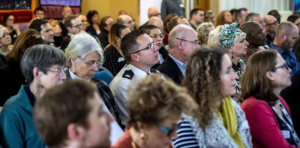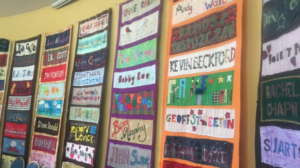CAMBRIDGE SUMMIT ON HOMELESSNESS

(With grateful thanks to Rev’d Jon Canessa for providing his valuable perspective, knowledge and original text)
In response to the ever increasing numbers of people sleeping outside in Cambridge, a summit was convened at St Paul’s church on the 29th November 2018. Wintercomfort for the Homeless, a drop-in centre supporting people who are homeless and those at risk of becoming homeless, has seen a year-on-year increase in the numbers of people accessing its services. Whilst a recent think-tank report identified Cambridge as having the greatest disparity of wealth in the UK in a league table of 57 other cities.
“I remember posting a letter last year and counting 6 people in sleeping bags on my 200 yard walk from the church to the post office. Considering the wealth, resources and good-will that a city like Cambridge possesses, my thought was, ‘we can do better than this’”
Rev’d Jon Canessa, Bishop’s Officer for Homelessness in Ely Diocese
HOW IT STARTED

At the start of 2018, Chris Jenkin visited Manchester to attend a meeting chaired by Andy Burnham, Mayor of Greater Manchester. The meeting successfully brought together public, private, charity and faith communities to tackle what Andy Burnham called “the growing crisis of our time”. Whilst there, Chris met Gary Dunstan from Street Support, who would later provide invaluable guidance throughout the planning of the Cambridge summit.
With the support of the Bishop of Ely, a team of people was pulled together to work out who needed to be involved to begin a city-wide conversation for change. In addition to those working within the homelessness sector and the local authorities, senior representatives from the business sector and Cambridge University and Colleges were involved – crucial to any conversation about affecting real change.
Dr Rowan Williams, Master of Magdalen College, former Archbishop of Canterbury and an advocate for social justice kindly agreed to convene the summit. On a recent walkabout with the Street Pastors in Cambridge, Dr Williams commented:

“What I remember most – alongside the crowds spilling out of the clubs at two in the morning – were those lying in the shop doorways. And the contrast couldn’t have been sharper there. On the one hand I’ve seen young people respond very generously, very humanely to those in the doorways and on the other, I see the crowds walking past completely blind. I want to underline that difference: some look and some don’t look, and that’s a choice. At the end of the day, are we going to look?”
The summit was a way to ask people in the city to take a look together. Cambridge is a city on the world stage. It has invented, solved, inspired and delivered huge change to humankind. It possesses what is needed to tackle its own homelessness problem – ideas, imagination, intelligence, expertise, leadership, wealth and humanity. Just as in Greater Manchester, the thinking was that it would take the whole city to address the difficulties people who are homeless face. The idea for the summit logo and slogan “It takes a city” was born.

But how to get the city’s most influential people in the same room at the same time? Over 250 personalised invitations from Dr Williams were sent to identified Cambridge ‘influencers’: those in high profile businesses and retailers; those who represent Cambridge University; media; local authority; schools; health and social services; service commissioners; housing and homeless organisations; police and faith groups. The event was sponsored by Deloitte which was important for practical reasons and for what it signified; the conversation needed to include local and global businesses that are based in Cambridge.
Co-production with (and not to) people with a personal insight into homelessness were central throughout. Planning the summit, sharing views, discussing challenges and shaping decisions.
Gary’s guidance and experience helped navigate a way (and avoid the pitfalls) through a range of decisions whilst always being inclusive of the people most affected by these decisions:
⦁ Ensuring there is a presence of people with experience of homelessness in the room.
⦁ Not trying to control or overly stage-manage the summit – trust in the process.
⦁ Creating a space where the voices of peoples with personal insight into homelessness are heard – they are the VIPs in the room and need to speak their truth.
IT TAKES A CONVERSATION
A comprehensive briefing document was sent to delegates two weeks prior to the summit giving context to each of ten conversations and highlighting gaps in provision. More on the CONNECTING CONVERSATIONS here:
The 10 conversations were all hosted by a skilled facilitator with at least one or two people with personal insight of homelessness in each conversation. Significantly, when all delegates had chosen their ‘conversation’ and sat talking enthusiastically, the only rooms not being used for discussion were the toilets and the kitchen!
 “This has been good and I am hopeful. . . but let’s wait and see what happens. Its action that’s needed”.
“This has been good and I am hopeful. . . but let’s wait and see what happens. Its action that’s needed”.
(delegate commentary)
With the help of Wintercomfort for the Homeless, the media were informed well in advance. ITN produced a very supportive report, together with good social media exposure and an excellent double page spread in the local newspaper.
3 months on since the summit and eight of the ten action groups have met. A significant amount of money has been pledged by a business looking for similar matched funding from 5 other businesses. A steering group has been set up to ensure each action group is informed by the following values:
⦁ Personal insight (so people with experience of being homeless are shaping the process and own the outcomes).
⦁ Access to subject matter & expertise (to ensure the wheel isn’t reinvented and involve existing experts already involved).
⦁ Local and do-able (realistic actions that can be achieved together by the community)
⦁ Action orientated (have clear goals and objectives)
Suggested advice for other cities considering hosting their own city conversation:
⦁ Pitch the event in the right way from the beginning.
⦁ Be proactive, creative and persistent with efforts to ensure you involve the right people and organisations.
⦁ Identify and nurture people who are passionate about social injustice.
⦁ Ensure people with experience and insight are a major part of the process at every stage.
⦁ Skilled facilitation is essential, together with a need to uphold the spirit of the event and the ability to ensure this spirit is respected when threatened by egos, politics and cynicism.
⦁ Set a set a date for a follow up event and be prepared for the summit to generate a lot of work immediately afterwards.
There is no quick fix solution to this crisis, but as evidenced by Cambridge, where there is a will there may just be a way. If this inspires you to start a conversation in your city, please contact Gary
gary@streetsupport.net
Thanks for your time